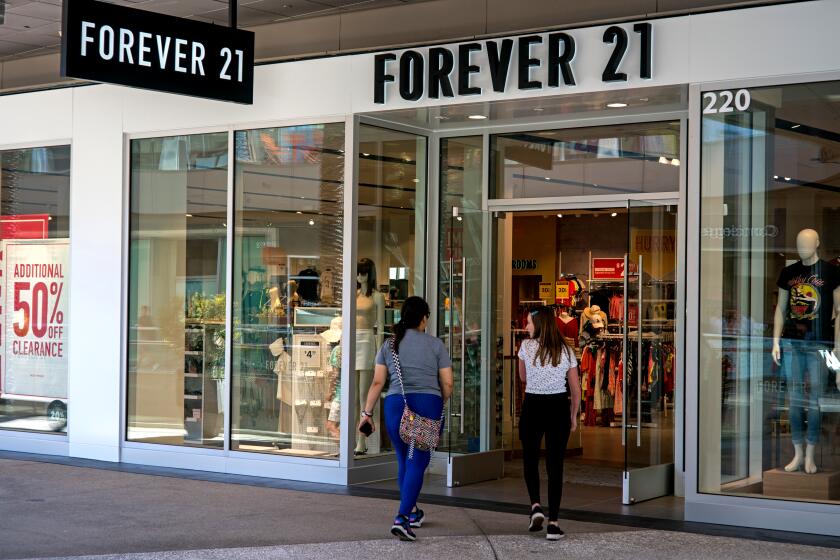Worker visas under attack
- Share via
As U.S. employers start applying today for visas for foreign workers, the hiring of talent from other countries is facing heightened scrutiny and the threat of greater restrictions as domestic unemployment soars.
In recent years, the annual competition for 85,000 temporary work visas awarded to foreign computer technicians, engineers, university educators and other highly skilled professionals has drawn twice as many applications as spots available.
But this year immigration attorneys are predicting that the recession will result in fewer applications, while critics of the visa program are vowing a renewed push to regulate it more closely.
In February, President Obama signed off on a stimulus package that explicitly requires recipients of bailout funds to hire Americans over foreigners with the special visas, known as H-1Bs. Legislation that would impose similar restrictions on all employers is expected to be introduced in Congress this month.
“It’s wrong to bring in H-1B workers if we have [American] workers here, and it’s more unconscionable when you have a recession,” said Sen. Charles E. Grassley (R-Iowa), who is sponsoring legislation that would require firms seeking visas for foreign workers to make a good-faith effort to recruit Americans first, advertise positions on a Department of Labor website and take other actions.
But employers argue that skilled foreign workers complement rather than replace Americans, that they help create additional jobs and they produce innovations that benefit the U.S. economy.
At Microsoft Corp., for example, 35% of the patent applications the firm filed last year were the result of work by H-1B and green-card holders, according to a blog post Tuesday by the firm’s general counsel, Brad Smith.
Other backers of the visa program argue that employers that can’t hire the foreign talent they need in the U.S. might simply ship the jobs overseas.
“We totally understand the need to make sure U.S. workers are taken care of, but we want to make sure we don’t take away the jobs that H-1B programs have represented in the past,” said Robert Hoffman, a vice president of Silicon Valley software firm Oracle Corp. and co-chair of Compete America, a Washington-based network of 100 companies, trade associations and universities.
The H-1B program was established in 1990. The visa, valid for up to six years, requires foreign workers to have a bachelor’s degree or equivalent. Employers must pay an H-1B holder on a par with American workers who do the same kind of work.
But the visa does not require that employers attempt to hire Americans first, unless 15% or more of their workers are already on H-1B visas. The Grassley legislation would require all employers to seek Americans first.
The visa program came under increased fire since a 2008 government study showed that about 20% of a sample of 246 applications were fraudulent or had other violations. The alleged fraud included nonexistent businesses, phony educational degrees and false job descriptions. One employer who applied for a visa for a “business development analyst,” for example, actually obtained it for someone to wash clothes and maintain machines in a laundromat, the study found.
In February, federal agents arrested 11 people in California and five other states on charges of H-1B visa fraud and wage law violations. The crackdown was led by U.S. immigration officials and the U.S. attorney’s office in Iowa, which accused the employers of displacing qualified American workers.
John Miano of the Programmers Guild, an advocacy group for U.S. technology workers, said H1-B workers annually earn about $12,000 less than Americans in the same jobs, in part because some employers deliberately misinterpret the program’s wage guidelines. He argued that there was no shortage of qualified American computer programmers and alleged that employers contended there was a shortage so they could hire cheaper foreign labor.
Immigration officials vow to monitor visa petitions more closely with a beefed-up fraud unit that has mushroomed from a dozen officers in 2004 to 650 now, with more than one-third of them added in just the last year.
Adding to the uproar, a government report in February showed that the four firms that received the most foreign visas last year were all based in India. That fueled complaints that the employers were sponsoring workers to train them in the United States so they could take American jobs back to India through outsourcing.
But many employers argue that they could not remain competitive -- or even solvent -- without access to the global talent pool.
In the forbidding desert of the Imperial Valley, where poverty is high and literacy levels low, hospital administrator William Moore said he depended on the availability of Filipino nurses, pharmacists and lab technicians. His 65-bed El Centro Regional Medical Center, one of only two hospitals in the area, suffers from a constant shortage of skilled personnel, he said.
Moore said he was still waiting for visas for 20 nurses he needs from the Philippines; to fill the gap he must hire traveling nurses from other states who command twice the pay of local or foreign hires, he said.
“This is not an inviting place to live, and it is very difficult to attract people to come here,” Moore said. Speaking of foreign workers, he added, “We need these people badly.”
--
More to Read
Inside the business of entertainment
The Wide Shot brings you news, analysis and insights on everything from streaming wars to production — and what it all means for the future.
You may occasionally receive promotional content from the Los Angeles Times.











